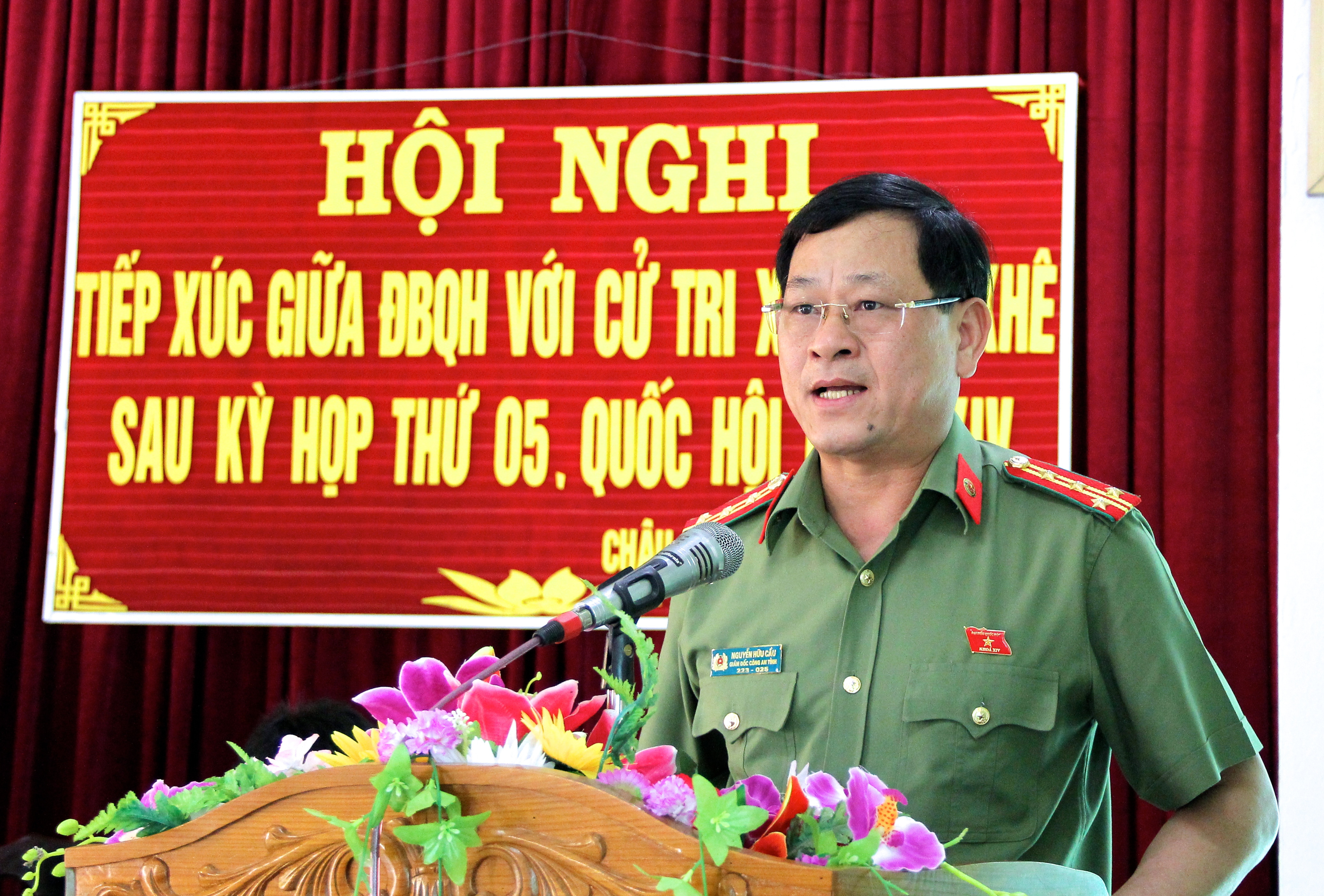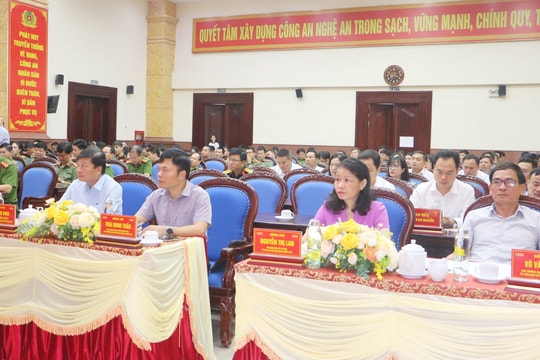Colonel Nguyen Huu Cau: 'Saying that the Cyber Security Law prohibits the use of Facebook is completely wrong'
(Baonghean.vn) - In response to different opinions on the Law on Cyber Security passed by the National Assembly, Colonel Nguyen Huu Cau - Director of Nghe An Provincial Police, a National Assembly delegate of the province, shared with voters about issues of public concern such as the right to use social networks, prohibited behaviors in the online environment...
 |
| Colonel Nguyen Huu Cau at a meeting with voters after the 5th session of the 14th National Assembly. Photo: My Nga |
Explain to voters about information that the regulation requiring virtual servers or representative offices in Vietnam causes difficulties for business operations.Colonel Nguyen Huu Cau said: The National Assembly has drafted the Law on Cyber Security since November 2016, according to the Resolution of the National Assembly. During the discussion and drafting process, many opinions said that setting up servers would cause difficulties for businesses. Then, when presenting it to the 4th session, the National Assembly raised the issue of how to adjust it according to the requirements of businesses, telecommunications and Internet corporations.
Accordingly, Clause 3, Article 26 of the Law on Cyber Security stipulates: "Domestic and foreign enterprises providing services on telecommunications networks, the Internet and value-added services on cyberspace in Vietnam must establish branches or representative offices in Vietnam. Data on personal information, data on relationships of service users, data created by service users in Vietnam must be stored in Vietnam".
"Therefore, with the propaganda of this regulation, it will have a terrible impact on the business activities of enterprises. I would like to affirm that the National Assembly has done this issue very carefully, even approaching those responsible for Google and Facebook with a spirit of listening and being receptive," said Colonel Nguyen Huu Cau.
Colonel Cau added that currently, there are 18 countries in the world that require businesses with representative offices to store user documents right on their territory, including the US, Russia, China, South Korea and many other countries.
In addition, the Commercial Law promulgated by the National Assembly in 2005, as well as the Foreign Trade Law of 2017, clearly stipulate that all foreign enterprises must have a representative office or headquarters in Vietnam. Enterprises providing information services are also considered as other enterprises. Therefore, the provisions of Article 26 of the Cybersecurity Law are completely appropriate.
Law on Cyber Security stipulated in Article 26on ensuring information security in cyberspace. Accordingly, electronic information pages, electronic information portals or specialized pages on social networks of agencies, organizations and individuals are not allowed to provide, post or transmit information with content that propagates against the Socialist Republic of Vietnam; incites riots, disrupts security, disturbs public order; humiliates, slanders; violates economic management order.
Domestic and foreign enterprises providing services on telecommunications networks, the Internet and value-added services on cyberspace in Vietnam are responsible for authenticating information when users register for digital accounts; Securing user information and accounts; Providing user information to the specialized force for protecting network security under the Ministry of Public Security upon written request to serve the investigation and handling of violations of the law on network security.
No later than 24 hours from the time of request from the specialized cybersecurity force under the Ministry of Public Security or the competent authority of the Ministry of Information and Communications, enterprises must prevent information sharing and delete information with violating content.
Domestic and foreign enterprises providing services on telecommunications networks, the Internet and value-added services on cyberspace in Vietnam must establish branches or representative offices in Vietnam. Data on personal information, data on relationships of service users, data created by service users in Vietnam must be stored in Vietnam.
Does the passage of the Cybersecurity Law cause Vietnam to violate signed international agreements, especially the WTO? "Absolutely not" - Colonel Nguyen Huu Cau affirmed.
For a country, national defense and security are always paramount. Therefore, when participating in any international trade agreement, security issues are always put first. Therefore, in every agreement there is a security exception, and every country is the same.
Thus, it is clear that, due to national security requirements, the National Assembly's promulgation of the Cyber Security Law is completely reasonable, aiming to protect the rights and interests of the country and its citizens.
What does the Cybersecurity Law prohibit? Currently, some information suggests that the Law prohibits people from using Facebook, Google, and other social networks. "This is completely wrong" - Colonel Nguyen Huu Cau emphasized.
Highlighting the prohibited acts for Internet users in the Law on Cyber Security, Colonel Nguyen Huu Cau said there are 6 groups of prohibited acts, including: Using cyberspace to incite riots, disrupt public security and order; providing false information, humiliating, slandering, and insulting the honor of others; causing confusion among the people, violating economic management order; enticing and inciting others to commit crimes. Conducting cyber warfare, cyber attacks, cyber terrorism, cyber espionage, and cyber crimes. Producing and using tools, means, software, or engaging in acts that obstruct or disrupt the operation of computer networks and telecommunications networks. Opposing or obstructing the activities of cyber security protection forces; illegally attacking and disabling cybersecurity protection measures. Taking advantage or abusing cyber security activities to infringe upon national sovereignty, interests, security, social order and safety, the legitimate rights and interests of organizations and individuals, or for personal gain. Other acts of using cyberspace to infringe upon national security, social order and safety, the legitimate rights and interests of organizations and individuals, or to violate the provisions of this Law.
Obviously, in the 6 prohibited acts, the Law does not have any provisions prohibiting people from using social networks. People are free to use social networks to operate normally, as long as they do not violate the criminal law that has been referred to.
"I firmly believe that only those who take advantage of this to incite will strongly oppose these regulations. For honest citizens, they are very necessary," Colonel Nguyen Huu Cau affirmed.
The Director of Nghe An Police added that there are currently nearly 3,000 online news sites operating with distorted content and false arguments aimed at defamation and slander. Therefore, Colonel Cau hopes that when using the Internet, people need to maintain a sober attitude and participate in the fight to refute those false arguments.
"We must resolutely eliminate those who oppose the revolutionary cause" - Colonel Cau sent a message of reminder and encouragement.

.jpg)

